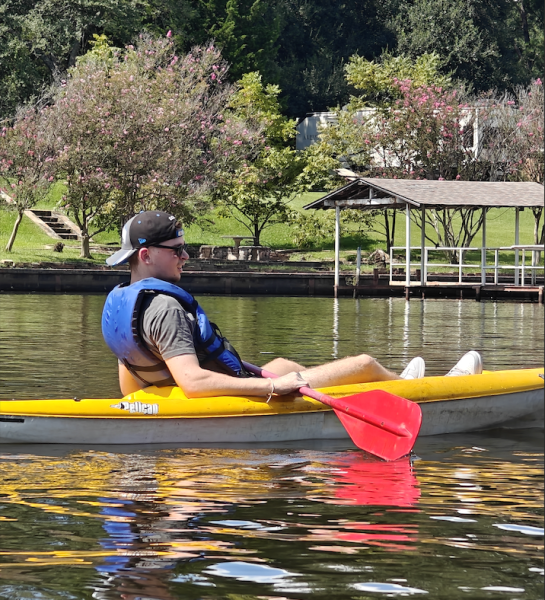Warhawk researches cheniers of Louisiana coast
Nautica Jones wins two grants to fund research on effects of climate change on vegetation diversity
Upon returning to her home in southern Louisiana after Hurricane Gustav, eight-year-old Nautica Jones looked around with teary eyes at the number of trees that had been blown away and destroyed by the hurricane.
The after effects of Hurricane Gustav on the forest in her neighborhood triggered her interest in the environment and the effects of climate change on vegetation.
Fast forward thirteen years later and Jones is a senior biology student at ULM researching the effects of climate change on the cheniers of the Louisiana coastline.
She now has two grants under her belt—one from the Garden Club of America and another from the Louisiana Garden Club Federation. She has also completed two internships. The most recent was with the Harvard Forest Summer Research Program, which she will be continuing this semester.
Jones juggles her research and academic work with the Honors Program, TRIO and a work-study job.
Her work focuses mainly on cheniers, which are land ridges native to the Louisiana coastline. They support the growth of live oak trees in that area.
The cheniers’ proximity to the coastline makes them unique but also poses a threat to their existence because of the accumulation of salt in the soil caused by the gulf. Because of this, most research sites are in Cameron and Vermilion parishes.
Jones’ research involves taking inventory and using drones to take near-surface images to investigate the changes in the vegetation—whether there are more invasive or desired plants in the area.
“Once we complete that and write a paper, it will be a resource to bring awareness to the problems facing the forests in that area,” Jones said. “I think the first line of defense with any issue is letting people know that there is an issue.”
Dr. Joydeep Bhattacharjee, Jones’ mentor and a biology professor at ULM, explained the importance of Jones’ research and how the grant will help Jones’ research expenses.
According to Bhattacharjee, the Garden Club of America and the Louisiana Garden Club Federation funded Nautica’s research work with $3,000 and $5,000.
“This cost will go toward buying the tools and software needed to produce accurate results. It will also help fund lodging at the research sites,” Bhattacharjee said.
Jones met Bhattacharjee when she was a student in one of his environmental science classes. After that class, Jones knew she had to do something related to ecology.
She went on to take all his ecology classes available for undergraduates.
“Nautica knows how to ask the right questions. She is one student that always completes a task regardless of whether she had done it before or not,” Bhattacharjee said. “Because of this, I am sure she will be a great role model for minority female students in STEM, and her impact will encourage them to go into the research field.”
Shermaine Thibeaux, Jones’ mother, was quite surprised when she first learned about the grant from the Garden Club of America because she did not even know Jones was applying for it. Once the surprise wore off, she was overwhelmed with pride for her daughter.
“Nautica has always been a bit of a perfectionist. Even when she is doing her hair, she focuses and tries to do it well,” Thibeaux said. “This characteristic has helped her achieve a lot in her field. Whenever she has an idea, she has always been one to follow through with it.”
Thibeaux described a conversation she had with Jones around the time of the most recent presidential election. That was the first time she understood the huge impact Jones was going to make on the world.
“While we were talking about President Biden’s energy conservation plan, Nautica easily explained a specific survey done for this plan,” Thibeaux said. “As I listened to her, I felt her passion and ability to explain the importance of conserving the natural resources, especially vegetation. That was also when I knew that this was not the end of her studies.”
Colby Pogue, a first-year pharmacy student who has been Jones’ friend for four years, said he was not surprised when he learned about Jones’ award.
Pogue said he first realized how passionate Jones was a year ago while hammocking on campus with her. He said that while they were relaxing, Jones took her time to explain the types of trees and plants around them.
“Nautica is very adventurous and willing to learn by exploring and trying new things,” Pogue said. “Because of this, I see her in many reputable scientific journals and articles in the future. I also see her work being used and applied all over the world to inspire other people and promote conservation of vegetation.”
Jones’ academic goals involve making her way to the Pacific Northwest to research the forest there. Her ultimate dream is to be a chair scientist for the United Nations and head the Climate Change Campaign’s research team.
“When I was in high school, I worried about whether I would have an academic future, if I would come up with good questions and have more opportunities to do research projects,” Jones said. “But the biggest thing I’ve taken away from attending ULM, as cliché as that sounds, is that life is what you make of it. Where you are is where you should be.”





